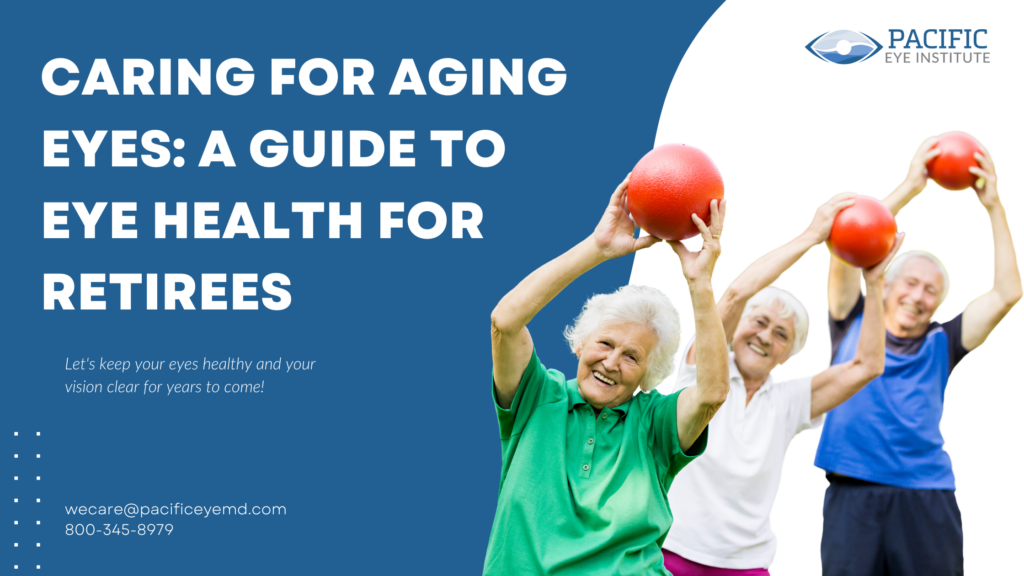
As we journey through life, our eyes are our constant companions, providing us with the gift of sight and allowing us to experience the world around us. But as we age, our eyes, like the rest of our bodies, undergo changes that can affect our vision and overall eye health. At Pacific Eye Institute, we understand the importance of caring for aging eyes and want to provide you with essential information on common eye conditions affecting retirees and how to maintain optimal eye health as you age.
Some Common Eye Conditions in Retirees:
Age-Related Macular Degeneration (AMD): Age-related macular degeneration is a leading cause of vision loss in retirees. It affects the macula, impacting central vision. Regular eye exams are vital for early detection. A diet rich in vitamins and minerals, including those found in leafy greens and fish, may help reduce the risk.
Cataracts: Cataracts involve clouding of the eye’s lens, causing blurred vision. Surgery is often recommended to remove cataracts. Retirees should have routine eye check-ups to monitor cataract development, and protective sunglasses can help prevent their formation.
Glaucoma: Glaucoma is characterized by increased intraocular pressure, leading to optic nerve damage. Regular eye exams are crucial for early detection, as symptoms may not be apparent until later stages. Treatment options include medication or surgery.
Diabetic Retinopathy: Diabetic retinopathy affects individuals with diabetes, leading to damage in the blood vessels of the retina. Managing diabetes through medication, diet, and exercise is key to preventing this condition. Regular eye exams can detect early signs, and timely treatment is essential.
Dry Eyes: Aging often leads to decreased tear production, causing dry eyes. Retirees should stay well-hydrated and use artificial tears if necessary. Adjusting environmental factors such as humidity and avoiding smoke can also alleviate symptoms.
Floaters and Flashers: The appearance of floaters (small specks or clouds moving in the field of vision) and flashes of light may indicate retinal issues. Retirees should seek immediate attention if they notice these symptoms, as they could be signs of retinal detachment.
Retinal Detachment: Retirees are at a higher risk of retinal detachment. Symptoms include sudden flashes of light, floaters, or a curtain-like shadow over the visual field. Immediate medical attention is crucial to prevent permanent vision loss.
Low Vision: Aging can result in low vision, where individuals experience significant visual impairment that cannot be fully corrected with glasses or surgery. Rehabilitation services and adaptive tools can enhance daily life for those with low vision.
UV Protection: Aging eyes are more susceptible to damage from ultraviolet (UV) rays. Wearing sunglasses with UV protection and wide-brimmed hats outdoors can help prevent conditions like cataracts and macular degeneration.
Caring for Aging Eyes: A Guide to Eye Health for Retirees
Regular Eye Exams: Schedule comprehensive eye exams with our experienced team at Pacific Eye Institute. Early detection is key to managing and treating eye conditions effectively.
Protective Eyewear: Wear sunglasses with UV protection to shield your eyes from harmful sun rays, especially during outdoor activities in the bright spring sun.
Monitor Chronic Conditions: Keep chronic conditions like diabetes and hypertension under control, as they can impact eye health. Follow your healthcare provider’s recommendations for managing these conditions.
Practice Good Eye Hygiene: If you experience dry eyes, use artificial tears as directed and follow proper eye hygiene practices to alleviate discomfort.
At Pacific Eye Institute, we are committed to helping you preserve your vision and enjoy a lifetime of healthy eyes. Call us at 800-345-8979 or click here SCHEDULE AN APPOINTMENT.
Remember, proactive care and regular eye exams are the keys to maintaining optimal eye health as you age. Let’s keep your eyes healthy and your vision clear for years to come!








